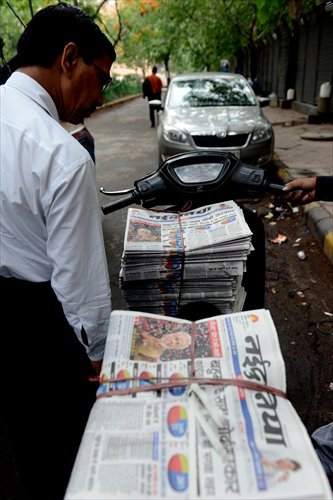Modi likely to be pragmatic toward China

A pedestrian reads the front page of a Hindi-language daily stacked on a newspaper deliveryman's scooter, with the headlines on exit polls showing opposition Bharatiya Janata Party (BJP) prime ministerial candidate Narendra Modi possibly clinching victory in the country's national election, in New Delhi on Tuesday. Photo: AFP
Narendra Modi, projected to become India's next prime minister according to multiple exit polls, is expected to present a tougher stance on political disputes but take a "more flexible" economic policy toward China, analysts said.
India's marathon general election, which ran for more than five weeks, closed polling stations on Monday.
Modi, a Hindu nationalist, led the right-wing Bharatiya Janata Party (BJP) to contest the ruling Congress party in the 543-member national parliament.
The BJP-led alliance is forecast to win from 270 to 282 seats, according to poll results by research group CSDS for the CNN-IBN television network, Reuters reported. Another poll by Nielsen for ABP News showed the BJP-led alliance hitting 281 seats.
Two other polls also indicated a majority for the opposition.
Official results are due to be released Friday.
A win by the BJP would strike a heavy blow to the Congress party, which has governed the country for most of its post-independence era.
The projected defeat of Congress has been attributed to India's sluggish economy and corruption scandals which marred Prime Minister Manmohan Singh's administration since he won re-election in 2009.
Modi, 63, who serves as chief minister of Gujarat in western India, is famed for his pro-business approach, and has made four trips to China to woo Chinese investment.
In a 2011 issue of The Economist, Gujarat was described as "India's Guangdong," as the state accounted for 5 percent of India's population but 16 percent of its industrial output and 22 percent of its exports.
Fu Xiaoqiang, a research fellow with the China Institutes of Contemporary International Relations, said judging from Modi's governance in Gujarat, he places emphasis on infrastructure development, attracting investment and the establishment of special economic zones.
"Economic development and improving people's livelihoods are expected to be high on his agenda once he is elected prime minister," Fu told the Global Times on Tuesday.
"There is the possibility that he will expand Sino-India economic and trade cooperation and seek more Chinese investment," Fu said.
India's trade deficit reached $31.4 billion against China in 2013, according to Chinese government data.
Hu Zhiyong, a research fellow with the Institute of International Relations at the Shanghai Academy of Social Sciences, said the imbalance could not be reversed in the short term. Once Modi takes office, he is expected to exhibit some flexibility in economic policy with China, but will also create some new problems on bilateral trade frictions.
Currently, China's foreign direct investment into India only stands at $940 million, which was described as "far from satisfactory" by Chinese Ambassador to India Wei Wei in an interview with Indian media in April.
Hu said the shortfall resulted from India's politicization of economic issues. "Compared with capital from the US, Japan and South Korea, India has taken a more cautious and restrictive policy toward Chinese investment," Hu said.
The barriers imposed by Indian authorities had led to a withdrawal of most small and medium-sized Chinese companies from the market in Bangalore, southern India's tech hub, he said.
"There are also so-called security concerns over Chinese investment, which has led to denials of major investment by telecom giant Huawei in the country," Hu added.
The Hindustan Times said that Modi will be more confident about opening up to Chinese investment than the present Congress-led regime.
Fu also expects a reduction in investment barriers for Chinese companies under Modi's administration.
While closer economic ties between Beijing and New Delhi are expected, the nationalist leader has shown a hard-line stance against China during his campaign.
In February, Modi publicly called for Beijing to abandon its "expansionist attitude," referring to the two countries' border disputes.
Border troops from the two countries had a three-week standoff at a disputed area in the western section of the border in 2013.
Bhaskar Roy, a New Delhi-based strategic analyst, said Monday in a publication of the Chennai Center for China Studies, that during his second term, Singh seemed weak and indecisive especially when dealing with China and Pakistan, and characteristically, Modi is very different from Singh.
"The BJP has long held a hard-line position toward China. Modi will no doubt inherit the party's stance. He will be tougher against Beijing and use border disputes, the Tibet question and the Dalai Lama to bargain with China," Hu said.
But Indian broadsheet the Daily News and Analysis maintained that Modi is "a man of great pragmatic vision," therefore such assertive statements against China do not take away the importance he places on China as a trading partner.
"The two countries have reached a border defense cooperation agreement [in October 2013] and both maintained that the disputes should be solved through negotiations," Fu said, noting the border disputes are controllable and will not threaten bilateral cooperation in other areas.
Newspaper headline: India’s restrictive policies barrier to trade with China